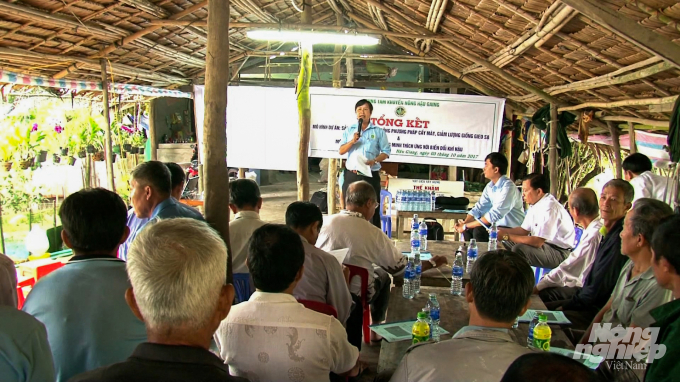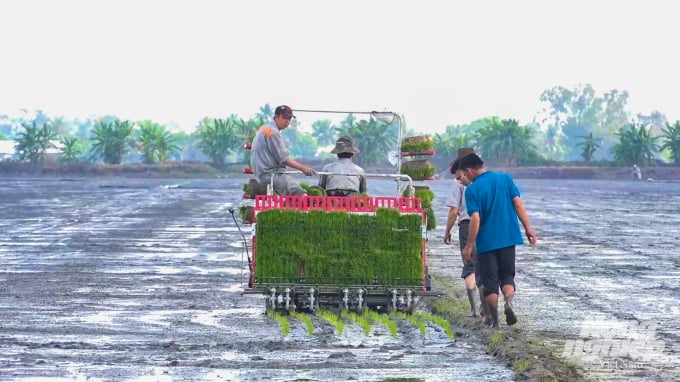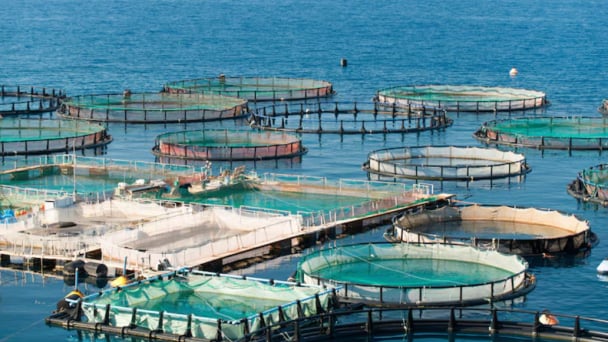June 4, 2025 | 17:19 GMT +7
June 4, 2025 | 17:19 GMT +7
Hotline: 0913.378.918
June 4, 2025 | 17:19 GMT +7
Hotline: 0913.378.918
Phuoc Loc Agriculture Cooperative located in Chau Thanh A district, Hau Giang province is one of the farmer organizations have received support from the Vietnam Sustainable Agriculture Transformation Project (VnSAT). Since 2015, the cooperative's members have bravely adopted sustainable farming methods to their fields; thereby increasing the area under rice cultivation to more than 400 hectares.
Tran Trung Kien, Director of Phuoc Loc Agriculture Cooperative said VnSAT invested nearly VND 8 billion into the cooperative to build warehouse, drying room on an area of 3,000 square meters. Currently, Phuoc Loc cooperative has become the focal point that buys rice from not only its members and affiliate groups but also other rice growers in the province. The cooperative can buy up to 5 tons of rice every crop. According to Kien the most important thing is that the local farmers are getting used to production on demand, focusing on cultivating high-quality rice varieties that meet the standards of food safety and export markets.
After nearly 7 years of implementation, the project has brought positive results to Hau Giang province such as synchronous infrastructure, creating awareness among farmers for the adoption of sustainable rice farming practices.

A training course on sustainable rice farming practices. Photo: Kim Anh.
Vo Minh Phuc, Deputy Director of Hau Giang VnSAT project said "During the implementation of the project, enterprises also realized the importance of the project and pledged to buy paddy rice grown in some certain project areas. Over the past years, the local farmers have benefited from the project and Hau Giang province met even exceeded the targets set by the project."
Le Van Hien, Director of VnSAT project said the project has brought massive changes to the rice industry in the Mekong Delta . Hien added "The most important thing is that the project has changed farming habits of the local farmers even after it finished."
Moreover, the investments in infrastructures will have a great impact on building new-style rural areas in the region. With traffic, irrigation infrastructures, power line system and warehouses developed methodically, rural life in the South has been improved significantly, contributing to the completion of the goals of building new rural areas.
Keeping in close touch with farmers and giving them assistance along with focused investment are what farmers need and VnSAT project has met that expectation. At a conference held on March 16, 2022 to speed up the progress of Year Plan for 2022 - Rice Component of Project Management Unit VnSAT, Deputy Minister of Agriculture and Rural Development Le Quoc Doanh assessed that rice component in the Mekong Delta in particular developed intensively in terms of quality. Notably, 77% of the area under rice cultivation in the Mekong Delta is planted with high-quality varieties. Adopting technical advances has helped farmers reduce the cost of rice production

Farmers have bravely changed their farming habits with the introduction of mechanization to production. Photo: Kim Anh.
Deputy Minister Le Quoc Doanh expressed "Since 2015 when we implemented the project people talked a lot about rice quality. Especially, in 2021 when the Covid-19 pandemic spread widely rice-growing area were reduced by about 40,000 hectares a year to make room for other farming models and other crops. According to the statistics, up to 77% of the area under high-quality rice varieties were introduced with advanced techniques, and thus, production costs could be cut down.
According to Project Management Unit VnSAT, in 2021 the Mekong Delta provinces organized training courses on "3G3T" (3 reductions 3 increases) technique for more than 155,000 farmers who cultivated rice on 213,500 hectares. At the same time, the provinces in the project areas trained at least 104,000 farmers on "1P5G" (1 must 5 reductions) technique on a growing area of 146,800 hectares. The results achieved were far better than expectations.
VnSAT project will invest into three phases to support farmer organizations and cooperatives in 8 Mekong Delta provinces. Under the project, 91 sub-projects have been implemented. Among them 88 sub-projects have been completed and put into operation so far.
With the assistance of VnSAT, 53 pumping stations, 181 kilometers of road, 39 warehouses with a capacity of above 41,000 tons, 25 drying machines have been invested to improve rice value in the Mekong Delta.
Translated by Mai Tham

(VAN) Technology is redrawing the map of Vietnamese aquaculture: more modern, greener, and more sustainable.

(VAN) Novel process harnesses machine learning to reveal groups of genes that determine how efficiently plants use nitrogen.

(VAN) Several scientists and farmers are experimenting with soil treatment in some key durian-growing regions such as Cai Lay (Tien Giang), Dak Song, Gia Nghia, and Dak R’lap (Dak Nong).
/2025/05/25/4127-3-073637_820.jpg)
(VAN) Thanks to the promotion from an FAO-implemented project, vegetable production in greenhouses in Moc Chau has seen strong development, from 1.5 hectares in 2021 to nearly 50 hectares in 2024.

(VAN) FAO has recently supported USD 140,000 to implement the project 'Risk mitigation human-animal interface risks through disease control initiatives in pig farming.'

(VAN) The People's Committee of Tra Vinh province has approved an adjustment to the investment policy for the Green Hydrogen Plant project, increasing its area to approximately 52.76 hectares.
![Reducing emissions from rice fields: [2] Farmers’ commitment to the soil](https://t.ex-cdn.com/nongnghiepmoitruong.vn/608w/files/news/2025/05/05/dsc08881jpg-nongnghiep-140632.jpg)
(VAN) Clean rice cultivation model in Thuong Tan commune, Bac Tan Uyen district, is assisting local residents in achieving sustainable agriculture by substantially reducing costs, increasing productivity, and protecting the environment.